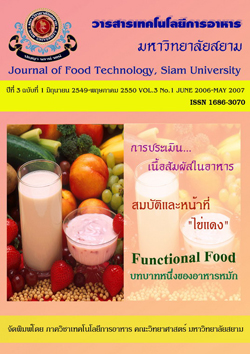ผลของปริมาณวิตามินอีที่ลดลงต่อความคงตัวของการเกิดปฏิกิริยาออกซิเดชัน ของน้ำมันถั่วเหลืองที่อุณหภูมิสูงระดับการทอด
Main Article Content
Abstract
รายงานวิจัยฉบับนี้แสดงให้เห็นถึงผลของปริมาณวิตามินอีที่ลดลงต่อความคงตัวของการเกิดปฏิกิริยาออกซิเดชันของน้ำมันถั่วเหลืองบริสุทธิ์ที่ให้ความร้อนที่อุณหภูมิสูง 160oC นาน 180 นาที น้ำมันถั่วเหลืองบริสุทธิ์ที่ใช้ในการทดลอง มีปริมาณวิตามินอีเริ่มต้น 345.37 27.67 ไมโครกรัมต่อกรัมน้ำมัน และมีสัดส่วนของกรดไขมันอิ่มตัว กรดไขมันไม่อิ่มตัวหนึ่งพันธะคู่ และกรดไขมันไม่อิ่มตัวหลายพันธะคู่ เท่ากับร้อยละ 17.11
1.67, 23.44
1.31 และ 58.34
4.34 ตามล้าดับ หลังจากให้ความร้อนที่อุณหภูมิ 160
4oC เป็นระยะเวลา 30, 60, 90, 120 และ 180 นาที พบว่าปริมาณวิตามินอีทั้งหมดลดลงเหลือ 115.72
12.66 ไมโครกรัมต่อกรัมน้ำมัน เมื่อผ่านการให้ความร้อนนาน 180 นาที ในขณะที่สัดส่วนของกรดไขมันไม่อิ่มตัวหนึ่งพันธะคู่และกรดไขมันไม่อิ่มตัวหลายพันธะคู่ลดลง แต่สัดส่วนของกรดไขมันอิ่มตัวกลับเพิ่มขึ้นอย่างมีนัยส้าคัญ (P
0.05) ตลอดระยะเวลาที่ให้ความร้อนนาน 180 นาที เมื่อวิเคราะห์ค่าเปอร์ออกไซด์ในนำ้มันถั่วเหลืองที่ผ่านความร้อนพบว่า มีค่าเพิ่มขึ้นอย่างต่อเนื่องและมีค่าสูงสุดหลังจากให้ความร้อนที่ 160oC นาน 120 นาที (64.98
4.33 meq O2/ kg oil) หลังจากนั้นจะลดลงจนกระทั่งถึง 180 นาที ในขณะที่ค่า TBA เพิ่มอย่างช้าๆ ในช่วง 120 นาทีแรก และเพิ่มขึ้นอย่างรวดเร็วหลังจาก 120 นาที โดยมีค่าสูงสุดเท่ากับ 13.66
2.62 เมื่อได้รับความร้อนนาน 180 นาที และมีแนวโน้มเพิ่มขึ้นอย่างต่อเนื่อง ดั้งนั้นการให้ความร้อนกับน้ำมันถั่วเหลืองที่อุณหภูมิ 160oC นาน 180 นาทีทำให้วิตามินอีลดลงและความคงตัวของน้ำมันถั่วเหลืองลดลงอย่างรวดเร็วจากปฏิกิริยาออกซิเดชันซึ่งเป็นผลจากการได้รับความร้อนสูงที่ระดับการทอด
Effect of Decreasing Tocopherol Contents on Oxidative Stability of Soybean Oil during Deep-Frying Temperature
This research indicated the effect of decreasing tocopherol contents on oxidative stability in refined soybean oil at 160oC for 180 min. The initial content of tocopherol in refined soybean oil used in this experiment was 345.37 27.67
g/ g oil. The ratio of saturated fatty acid, monounsaturated fatty acid and polyunsaturated fatty acid were 17.11
1.67, 23.44
1.31 and 58.34
4.34%, respectively. After heating at 160
4oC for 30, 60, 90, 120 and 180 min, the total tocopherol contents decreased consecutively to 115.72
12.66
g/ g oil at 180 min. Consequently, the ratio of monounsaturated fatty acid and polyunsaturated fatty acid decreased but the ratio of saturated fatty acid increased significantly (P
0.05). The PV value of the heated soybean increased continuously until the highest value (64.98
4.33 meq O2/ kg oil) 120 min, and then it decreased slightly until 180 min of heating. On the other hand, TBA increased slightly at the first 120 min, and increased steeply after 120 min to the highest value 13.66
2.62 at 180 min. Therefore, prolong heating soybean oil at 160 oC leaded to the decreasing of vitamin E and fast decreasing oxidative stability.
Article Details
Copyrights of all articles in the Journal of Food Technology available in print or online are owned by Siam University and protected by law.


